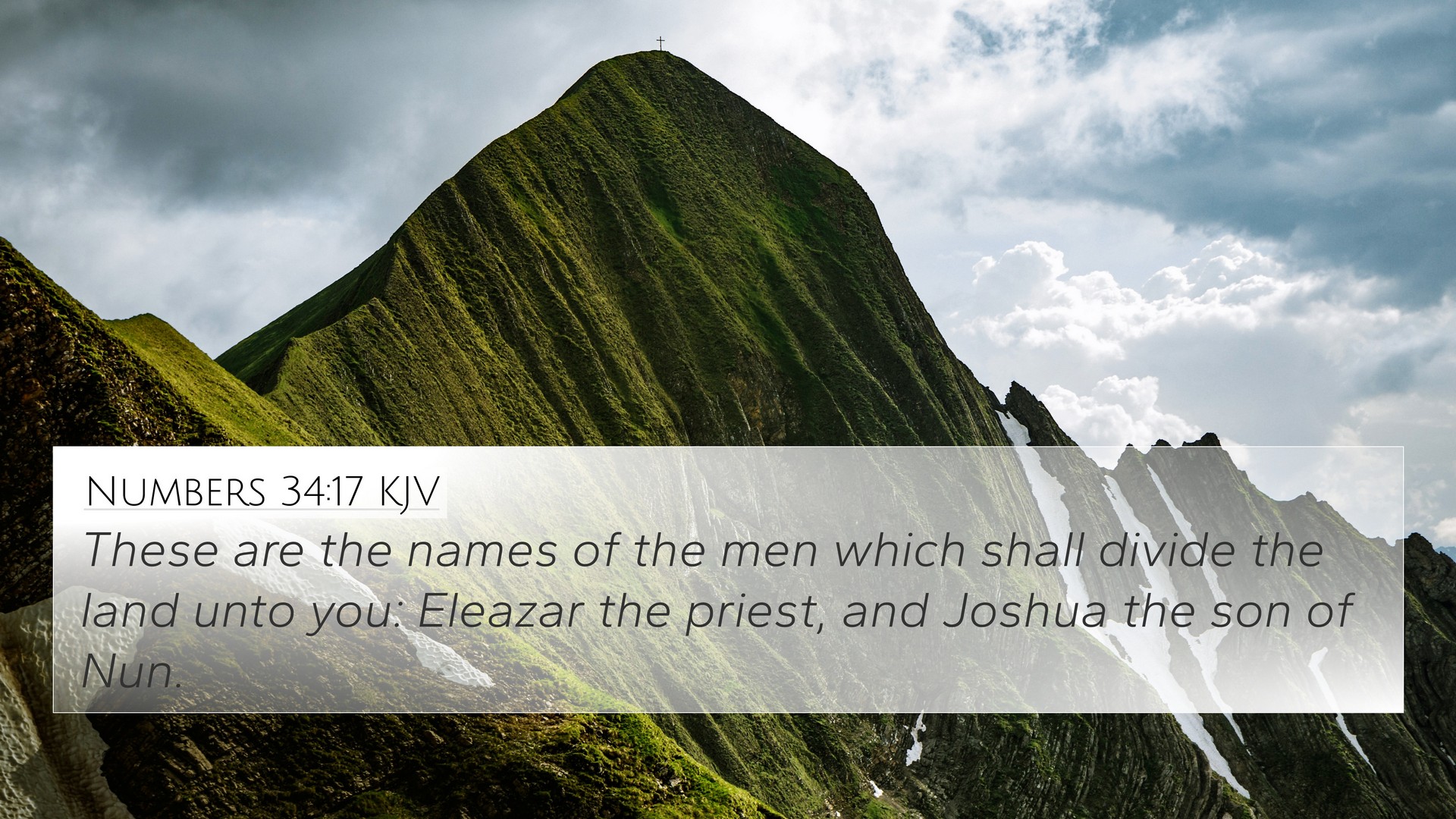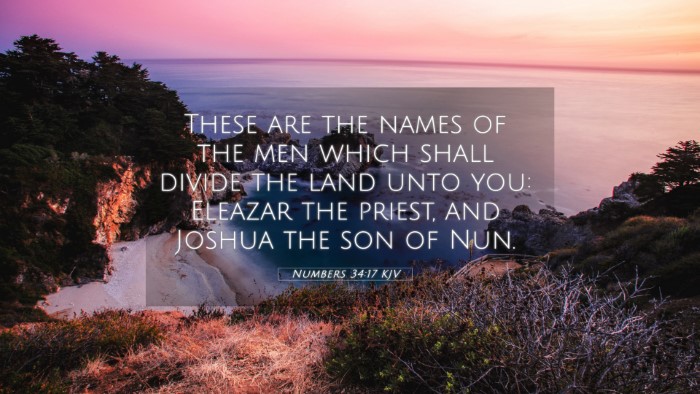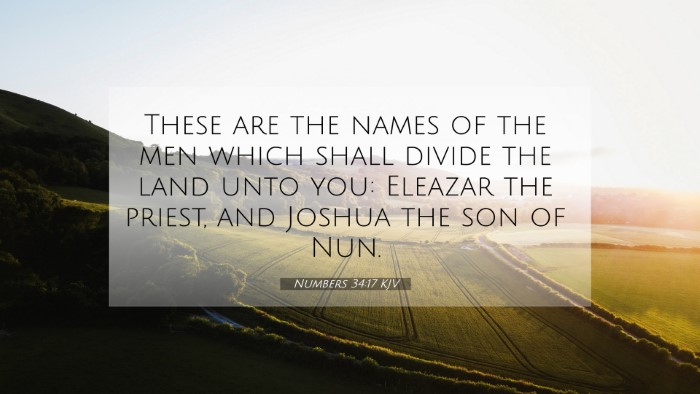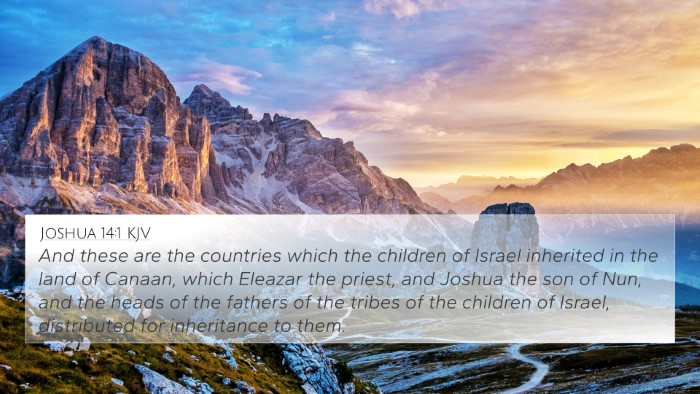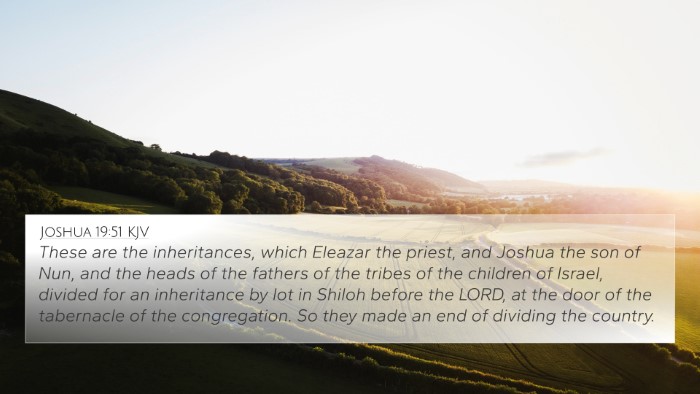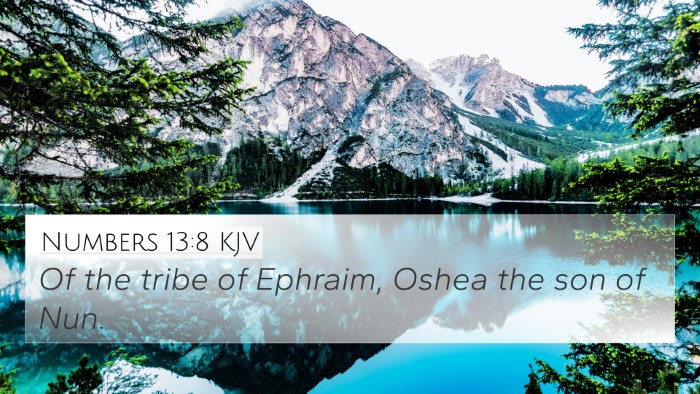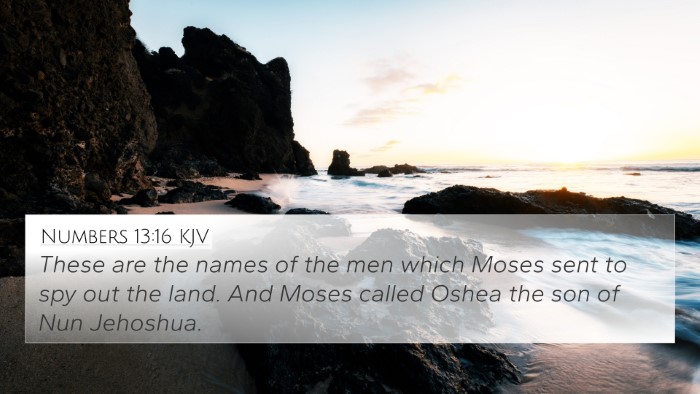Exegesis of Numbers 34:17
Verse: Numbers 34:17
Overview
Numbers 34:17 states: "These are the names of the men which shall divide the land unto you: Eleazar the priest, and Joshua the son of Nun." This verse marks a significant moment in the history of Israel as they prepare to enter the Promised Land. It emphasizes the roles of leadership given to both the religious and military figures, Eleazar and Joshua.
Contextual Significance
This verse occurs towards the end of the book of Numbers, which records the Israelites' journey through the wilderness and the covenantal stipulations they encountered. The calling of Eleazar and Joshua for the task of dividing the land highlights the collaborative effort between the priestly and civil authorities in fulfilling God's promises.
Commentary Insights
Matthew Henry's Commentary
Matthew Henry emphasizes the importance of the roles of Eleazar and Joshua, representing the spiritual and civil leadership within Israel. He suggests that this partnership is vital in ensuring that the land distribution is executed in accordance with God's will, showcasing a divinely ordered society. Henry points out that leadership must come together in unity when handling responsibilities that affect the community.
Albert Barnes' Commentary
Albert Barnes notes that the selection of both Eleazar and Joshua as leaders for dividing the land is significant. Eleazar, being the high priest, symbolizes God's presence and authority, while Joshua embodies military leadership. Their teamwork not only facilitates a just division of the land but also strengthens the foundation of Israel’s future in Canaan. Barnes emphasizes the necessity of divine guidance in undertaking such pivotal responsibilities.
Adam Clarke's Commentary
Adam Clarke argues that this passage serves to highlight God’s meticulous planning in leading His people. Clarke delineates that the names mentioned exemplify God's provision and guidance for His people, ensuring that their mission aligns with His divine purpose. He elaborates on the significance of following God’s directives, especially in the context of leadership roles.
Thematic Connections
This verse can be cross-referenced and connected with several other passages throughout the Bible that highlight similar themes of divine guidance, the roles of leaders, and the faithful execution of God's command.
Cross-References
- Joshua 1:1-9: The commissioning of Joshua as a leader mirrors the appointive context in Numbers 34:17.
- Deuteronomy 3:28: This passage further emphasizes Moses’ charge to Joshua, reflecting the continuity of leadership.
- Numbers 27:18-23: The appointment of Joshua by Moses showcases the importance of choosing a capable leader to continue God’s work.
- Hebrews 4:8: This verse draws a parallel between Joshua leading the Israelites to rest in the land, akin to the promised rest in Christ.
- Exodus 18:21: The principle of appointing capable leaders is rooted in the advice of Jethro to Moses, advocating for effective governance.
- 1 Chronicles 24:3: The role of priests, similar to Eleazar's in Numbers 34:17, is established within the context of Israel’s worship practices.
- Romans 13:1: The biblical basis for leadership as ordained by God provides a New Testament connection emphasizing authority and governance.
- 1 Corinthians 12:28: This speaks to the diverse roles in the body of Christ, drawing parallels to the divinely chosen leaders in ancient Israel.
- Acts 1:24-26: The selection of Matthias as an apostle is another demonstration of seeking God’s will in leadership selection.
- Proverbs 21:1: This focuses on God's sovereignty over the hearts of leaders, much like He directed Eleazar and Joshua.
Applications and Reflections
The implications of Numbers 34:17 extend to present-day believers as well. Understanding that God appoints leaders and directs their paths can encourage faith in His plans. The emphasis on spiritual and civil leadership brings forth the idea that these facets should work in tandem to fulfill God’s intentions.
Providing Tools for Understanding
Utilizing resources such as a Bible concordance and cross-reference systems can greatly enhance one’s comprehension of scriptural connections. Engaging in cross-referencing Bible studies or employing a Bible cross-reference guide enables deeper insights into the interconnectedness of various biblical texts.
Conclusion
Numbers 34:17 serves as a powerful reminder of the importance of divine leadership in the fulfilling of God's promises. The collaboration between Eleazar and Joshua illustrates the crucial dynamic of spiritual and practical governance in a community. The cross-references provided illustrate that throughout Scripture, God’s faithful direction and the establishment of leaders occur repeatedly, affirming the necessity of communal unity under divine authority.
